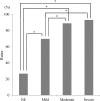Relationship between eating disturbance and dementia severity in patients with Alzheimer's disease
- PMID: 26266531
- PMCID: PMC4534398
- DOI: 10.1371/journal.pone.0133666
Relationship between eating disturbance and dementia severity in patients with Alzheimer's disease
Abstract
Background: Eating is one of the most important daily activities in managing patients with dementia. Although various eating disturbance occur as dementia progresses, to our knowledge, most of the studies focused on a part of eating disturbance such as swallowing and appetite. There have been few comprehensive studies including eating habits and food preference in patients with Alzheimer's disease (AD). The aims of this study were to investigate almost all eating disturbance and to examine the relationship of eating disturbance to dementia stage in AD.
Methods: A total of 220 patients with AD and 30 normal elderly (NE) subjects were recruited. Eating disturbance was assessed by a comprehensive questionnaire that had been previously validated. Potential relationships between the characteristics of eating disturbance and dementia stage as classified by the Clinical Dementia Rating (CDR) were assessed.
Results: Overall, 81.4% of patients with AD showed some eating and swallowing disturbance, whereas only 26.7% of the NE subjects had such a disturbance. Even in an early stage, patients with AD had many types of eating disturbance; "Appetite change" was shown in nearly half of the mild AD patients (49.5%). In the moderate stage, the scores of "change of eating habits and food preference" were highest, and in the severe stage "swallowing disturbance" became critical.
Conclusion: In AD, the relationship of dementia stage to eating disturbance differs according to the type of eating disturbance. The relationships between various eating disturbance and the severity of dementia should be considered.
Conflict of interest statement
Figures
References
-
- Frissoni GB, Franzoni S, Bellelli G, Morris J, Warden V. Overcoming eating difficulties in the severely demented In: Volicer L, Hurley A, editors. Hospice Care for Patients with Advanced Progressive Dementia. New York: Springer Publishing Company; 1998. pp. 48–67.
-
- Holm B, Söderhamn O. Factors associated with nutritional status in a group of people in an early stage of dementia. Clin Nutr. 2003;22(4): 385–9. - PubMed
Publication types
MeSH terms
LinkOut - more resources
Full Text Sources
Other Literature Sources
Medical


